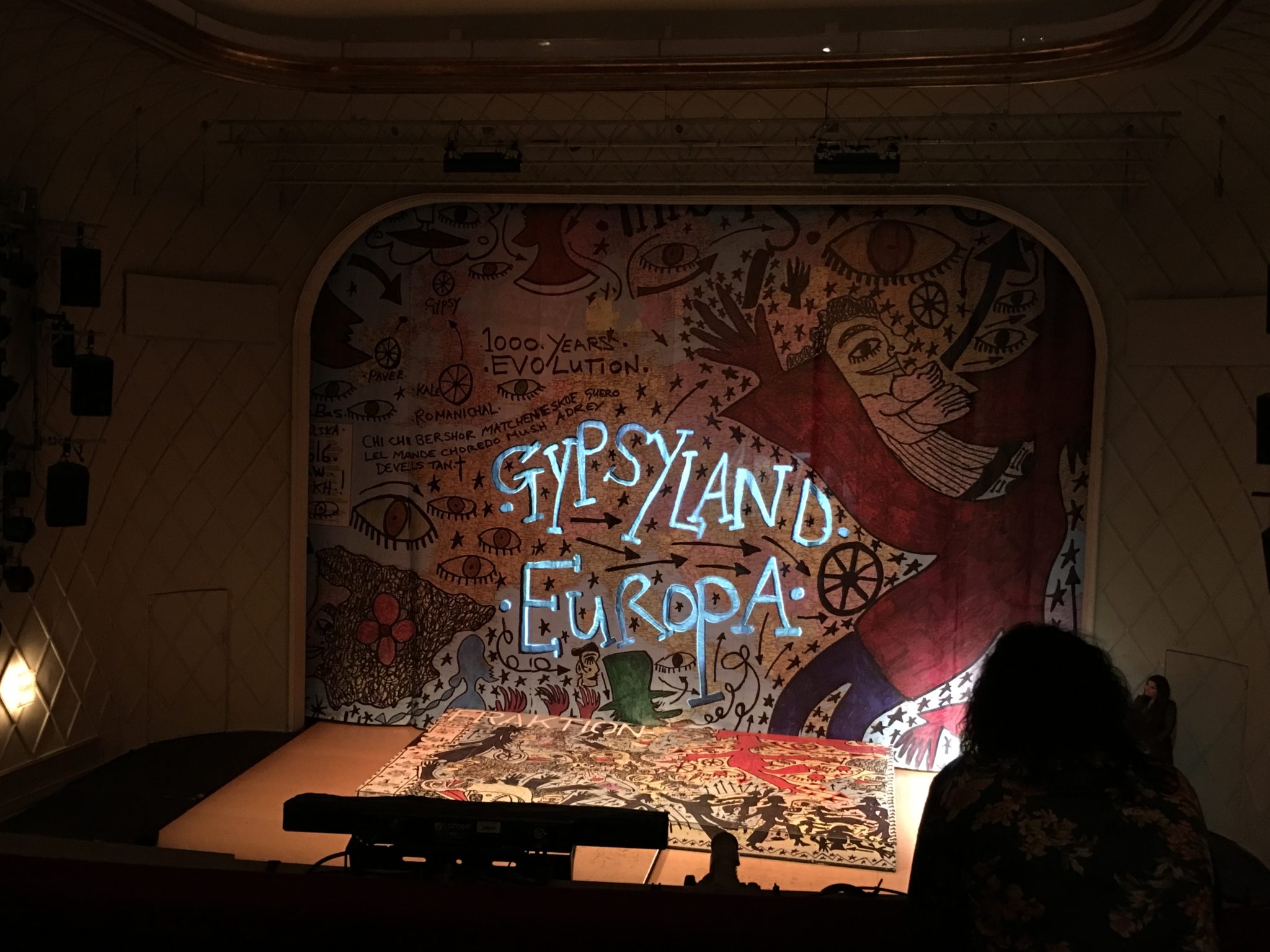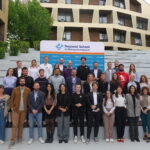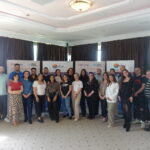The premier of the play “Roma Armee” (Roma Army), inspired by ideas of Sandra and Simonida Selimović, two young Roma artists coming from Serbia, was held on September last year in the theatre of Gorki, one of the most beautiful and venturous theaters in Berlin named after Maksim Gorki. From their childhood Sandra and Simonida are living in Austria, and since mid-nineties they are acting, rapping, and fighting for Roma rights, especially for rights of Roma women. In 2010 they founded the first feminist and professional theater association in Vienna. Two of them perform together with Roma from Austria, Germany, Kosovo, Romania, England and Sweden, with the support of German-Turkish actor and actress from Israel. Actress from Israel and director of this extremely startling and dynamic play, Yael Ronen, are members of Egzil ensemble that is created two years ago by professional artists who were forced to exile. The play came from long-standing conversations/confessions of the participants, who said that these talks looked like a long psychotherapeutic sessions, on the basis of which director of the play created a performance devoted to the necessity of self-defense, “the fight against structural discrimination, racism and anty-gypsism, as well as the emancipation of the internalized role of the victim.”
“Roma Armee“ is not a call for violence. It is a metaphor – looking for an answer to a feeling of powerlessness and exclusion, a scream of despair. In a scene where all actors are armed and fight against those who humiliate and endanger them, most of them are dying, and those who survive are killing each other (let’s remember a thirteen-year-old Dušan Jovanović, whom his father sent to a nearby shop in center of Belgrade to buy a Coca Cola, on October 18, 1997, when he was killed by skinheads only because he was Roma). Therefore, violence is not an answer, but how to fight for the place under the sun in a non-violent way? How to make Europe and Europeans aware that they are responsible for their largest and most vulnerable minority, if they want to preserve themselves and their values?
The theater play has its own motto that reminds us that the failure to respond to these and many other issues we face in the new flurry of nationalist populism, which is often carried by the fascist charge, threatens to bring us back into the darkest years that Europe has survived: “The community of the European Union broke into pieces when – and because – it has allowed its weakest member to be excluded and persecuted.“ (Hannah Arendt) The fact that the play is performed in “Gorki“ in front of a full hall after half a year, and that the audience at the end of a two-hour explosion of pain, love, despair and readiness to fight for a different future of Roma, each time ovate to express a hope, shows that this time fascism will not pass.
However, Roma and those who are willing to support them on the path of emancipation through empowerment and the right to self- esteem know that hope is not enough. The desire and need to stand on this path, among other things, lead through language that everyone understands – art and culture. Thus, few years ago Alliance was formed in order to support the establishment of the European Roma Institute for Arts and Culture. The Open Society Foundation and the Council of Europe have recognized the potential of this project and have supported it. In the Foundation, George Soros and the Office of the Roma Initiative (with the extraordinary wisdom and energy of the first man of the Office, Mr. Željko Jovanović) stood firm behind this initiative, when it was very hard to persuade some dissonant voices in the Committee of Ministers of the Council of Europe. Also, the Secretary General of the Council of Europe, Mr. Thorbjorn Jagland supported the same thing, as well as many others who have advocated for this initiative for years, believed in it by expanding the circle of support. But the basic force that sustained and empowered this initiative were Roma artist, cultural workers, researchers, scientists who were the most convincing argument that this dream can become a real institution.
And thus the European Roma Institute for Arts and Culture (ERIAC) was established. The decisive move in its formation came from Michael Roth, State Secretary for European Integration at the Ministry of Foreign Affairs of the Federal Republic of Germany, who offered Berlin as a host for the Institute. On June 8, 2017, the Institute was opened in the premises of the Ministry, and began operating in January 2018. It should be noted that the first international meeting on anty-gypsism was held on December 1, 2015 in the premises of the same Ministry, which undoubtedly encouraged the processes that led to the decision that Berlin became the host of the Institute.
ERIAC exists to increase the self-esteem of Roma and to decrease negative prejudice of the majority population towards the Roma by means of arts, culture, history and media. ERIAC acts as an international creative hub to support the exchange of creative ideas across borders, cultural domains and Romani identities. ERIAC aims to be the promoter of Romani contributions to European culture and talent, success and achievement, as well as to document the historical experience of Romani people in Europe. ERIAS exist to be communicator and public educator, to disseminate a positive image and knowledge about Romani people for dialogue and building mutual respect and understanding.
ERIAC has 6 principles that define its character:
- Respect of the dignity of Romani people and Romani identity
- Diversity and plurality of Romani identities and cultures
- Romani leadership with the support and co-operation of non-Roma
- Engagement and contribution of Romani organizations and individuals in the establishment and ongoing activities of the Institute
- Political autonomy and non-partisanship, openness for collaboration with public authorities and political institutions as partners
- Highest quality standards in the domains of arts and culture, as well in as its own operational performance
ERIAC is based on membership, and this concretely means that Institute will make decisions by voting in the General Assembly and will nominate members of Barvalipe Academy (Roma pride) that has 15 prominent individuals who will determinate strategy and work plan.
First published in Novi magazin no. 358, on 8 March 2018













